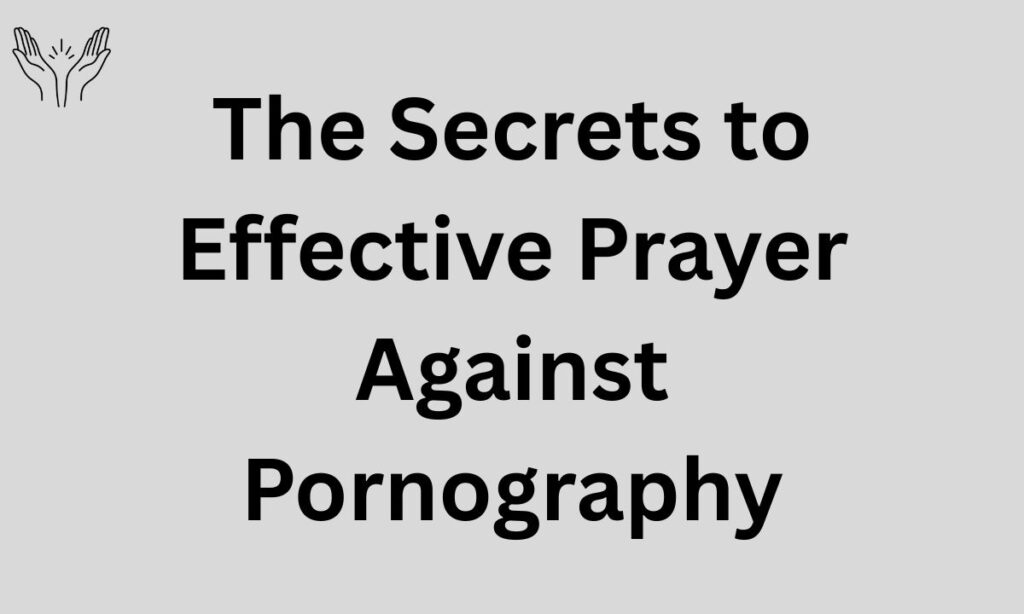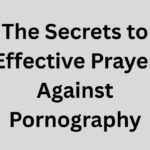In Matthew 7:7, Jesus promises, “Ask and it will be given to you; seek and you will find; knock and the door will be opened to you.” Yet many believers find themselves crying out to God for freedom from pornography, wondering why their prayers seem unanswered.
If you’ve ever prayed, “Lord, please deliver me from this addiction,” and felt like God wasn’t listening, you’re not alone. The struggle with pornography affects millions of Christians worldwide, creating cycles of shame, guilt, and spiritual confusion.
The truth is that God does hear every prayer, but effective prayer against pornography requires understanding, strategy, and persistent faith. This isn’t about praying harder or finding perfect words—it’s about approaching God with the right heart and aligning our prayers with His will.
🙏 Divine Prayer Generator
Select a prayer category to begin
How Should We Pray?
Prayer is more than making requests to God; it’s entering into relationship with Him. Many people treat prayer like a vending machine, but biblical prayer is fundamentally different—it’s about communion, surrender, and aligning our hearts with God’s purposes.
The foundation of effective prayer lies in understanding our relationship with God. We don’t approach Him as strangers begging for favors, but as beloved children coming to a loving Father. Hebrews 11:6 tells us that “without faith, it’s impossible to please God.” This doesn’t mean perfect faith, but believing that God is good, wants our freedom, and has power to deliver us.
Effective prayer requires complete honesty. God already knows our struggles and secret sins. Trying to hide our condition only creates distance in our relationship with Him. When we come before God with transparency about our pornography addiction, we create space for His grace to work.
Prayer should also be specific rather than vague. Instead of “help me be better,” we need to pray specifically about our triggers, thought patterns, relationships, and spiritual growth. God responds to specific prayers with specific answers.
Applying the Lord’s Prayer to Pornography
Jesus gave us the perfect prayer model in Matthew 6:9-13. The Lord’s Prayer isn’t just words to recite—it’s a framework that can revolutionize how we pray about sexual purity.
- “Our Father in heaven” reminds us we’re not alone in this battle. We’re part of God’s family, and our heavenly Father is personally invested in our victory. When shame tries to convince us we’re too dirty for God’s love, we remember we’re His beloved children.
- “Hallowed be your name” shifts our focus from our problem to God’s character. Before mentioning our struggle, we acknowledge God’s holiness, power, and goodness. This perspective change is crucial because pornography distorts our view of God.
- “Your kingdom come, your will be done” connects our personal battle to God’s larger purposes. Our fight isn’t just about comfort—it’s about advancing God’s kingdom and reflecting His character in a broken world.
- “Give us today our daily bread” acknowledges our daily dependence on God for strength to resist temptation. Victory comes through ongoing dependence, not one-time deliverance.
- “Forgive us our debts, as we also have forgiven our debtors” addresses guilt and shame that fuel addiction. We confess honestly, receive God’s forgiveness completely, and extend forgiveness to others who have hurt us.
- “Lead us not into temptation, but deliver us from the evil one” specifically requests protection and deliverance from spiritual forces wanting to keep us bound.
Some Points for Reflection
Establishing Relationship:
- Begins with “Our Father,” emphasizing intimacy with God before making requests.
- Highlights the importance of overcoming feelings of shame and disconnection from God.
God’s Perspective First:
- Worship and acknowledgment of God’s kingdom precede personal needs.
- This order shifts focus from self-centered desires to a broader understanding of God’s role.
Ongoing Dependence:
- “Give us today our daily bread” signifies the need for daily provision and support.
- Spiritual health requires continual communion with God rather than seeking one-time solutions.
Role of Confession and Prayer:
- James 5:16 underscores the importance of confession and prayer in the healing process.
- Acknowledges that healing involves both receiving and giving forgiveness.
Addressing Emotional Wounds:
- Recognizes that pornography may stem from deeper emotional issues that necessitate forgiveness.
Why Prayer “Doesn’t Work”?
Many sincere believers pray repeatedly for freedom but continue struggling. The problem isn’t with prayer itself, but often with our expectations, understanding, or approach.
We Don’t Understand What We’re Praying
Many pray for freedom without fully understanding what they’re asking. They want temptation to disappear instantly but aren’t prepared for the transformation process that true freedom requires.
Freedom isn’t just stopping a behavior—it’s rewiring our brains, healing our hearts, transforming relationships, and developing new thinking patterns. This process takes time and involves challenges many don’t expect.
Some pray for freedom but continue behaviors that feed addiction. They avoid hardcore pornography but continue provocative social media images. They ask God to remove temptation while maintaining habits that create temptation.
Understanding what we’re truly praying means recognizing that freedom is part of larger transformation. God wants to heal not just sexual behavior but our entire relationship with Him, others, and ourselves.
We’re Making a “Secret Confession”

One of the most common reasons prayer seems ineffective is keeping the struggle completely private. People pour out their hearts to God but refuse to share their burden with any human being.
James 5:16 clearly states, “Confess your sins to each other and pray for each other so that you may be healed.” Certain sins require community support for healing, and pornography addiction thrives in secrecy and isolation.
Secret confession limits access to practical help. Other believers might have resources, strategies, or experiences that could accelerate healing. When we keep struggles private, we forfeit valuable support.
The shame keeping us from confessing to others also affects our relationship with God. Even though God knows everything, shame creates emotional distance that makes prayer feel less authentic and powerful.
God Wants to Confront Our Pride
Pride is often a significant factor in pornography addiction, though it may not be obvious. James 4:6 says “God opposes the proud and gives grace to the humble.”
One form of pride is believing we should overcome this struggle alone. We ask God for help but resist the humbling process of seeking human help, using accountability tools, or admitting our struggle’s depth.
Another manifestation is perfectionism—believing we shouldn’t struggle with these issues or that struggle disqualifies us from spiritual service. This perfectionist pride prevents us from accepting our humanity and receiving God’s grace.
Sometimes God allows continued struggle specifically to address pride issues. He may be more concerned with developing our humility, dependence, and compassion than immediately removing temptation.
Porn is Only the Surface Issue
Many focus prayers exclusively on stopping pornographic behavior without addressing underlying issues that drive addiction. This addresses symptoms while ignoring causes.
Pornography addiction typically stems from deeper emotional, relational, or spiritual wounds—childhood trauma, rejection, loneliness, anxiety, depression, or unresolved grief. Until root issues are addressed, surface behavior will likely continue.
For some, pornography serves as emotional medication, temporarily relieving stress, sadness, anger, or boredom. Praying for freedom without developing healthier coping mechanisms removes their primary emotional survival tool without replacement.
Others use pornography to fill relational voids—loneliness, poor social skills, intimacy struggles, or relationship betrayal. Prayer must be accompanied by prayer for relationship healing and intimacy skill development.
We Need to Persevere
James 1:2-4 teaches that God allows trials to develop perseverance. One of the most challenging aspects is the need for long-term perseverance. Many expect quick results and become discouraged when breakthrough doesn’t come immediately.
Brain changes from pornography use don’t reverse overnight. Neural pathways reinforced thousands of times need time to weaken while new, healthier pathways strengthen. This neurological healing requires patience and consistent effort.
Spiritual transformation also follows natural processes requiring time. Character development, emotional healing, and relationship repair all need extended growth periods. God typically works through processes that develop our faith and maturity.
The testimonies of those finding lasting freedom consistently emphasize perseverance and importance. Breakthrough often comes not after weeks or months, but after years of consistent prayer, community support, and practical action.
God Works on His Own Timetable
2 Peter 3:8-9 explains that “a day is like a thousand years and a thousand years like a day” to God. One of the most difficult aspects is accepting God’s timeline, which rarely matches our preferences.
God’s timing reflects His perfect wisdom about what we need and when. He sees factors we can’t—our readiness for change, heart preparation needed, people who need to enter our lives, or circumstances needing alignment.
Sometimes God delays deliverance because He’s working on other life areas first—addressing pride, healing relationships, developing character, or strengthening faith before we’re ready for complete freedom.
Romans 8:28 promises that “God works everything together for good” for those who love Him. God’s timeline involves our maximum good, not just immediate comfort. The longer process produces deeper healing and stronger spiritual foundations.
God Will Answer Your Prayer

Despite complexities and challenges, we can have complete confidence that God will answer our prayers. His desire for our freedom is stronger than our own, and His power to deliver us is unlimited.
2 Corinthians 1:20 declares that “all God’s promises are yes and amen in Christ.” God’s commitment to answering our prayers is rooted in His character and promises. He delights in giving good gifts to His children, and freedom from bondage perfectly aligns with His will.
Many people testify to experiencing God’s answers in stages—first receiving help with shame, then developing healthier relationships, then experiencing reduced temptation, and finally achieving consistent victory. Each stage represents genuine answered prayer.
1 Corinthians 10:13 promises that “God will not let you be tempted beyond what you can bear, but will provide a way of escape.” God’s answers often include equipping us to help others with similar struggles, multiplying impact beyond our original expectations.
Conclusion
Prayer against pornography addiction is both simple and complex—simple because God loves us and wants our freedom, complex because true freedom involves comprehensive transformation taking time.
The secrets to effective prayer lie not in perfect words or intense praying, but in understanding God’s heart, aligning with His methods, and persevering through His designed healing process.

Daniel Miller is a passionate writer, SEO expert, and blogger, specializing in Bible verses, prayers, and faith-based content at PrayerVibe.







